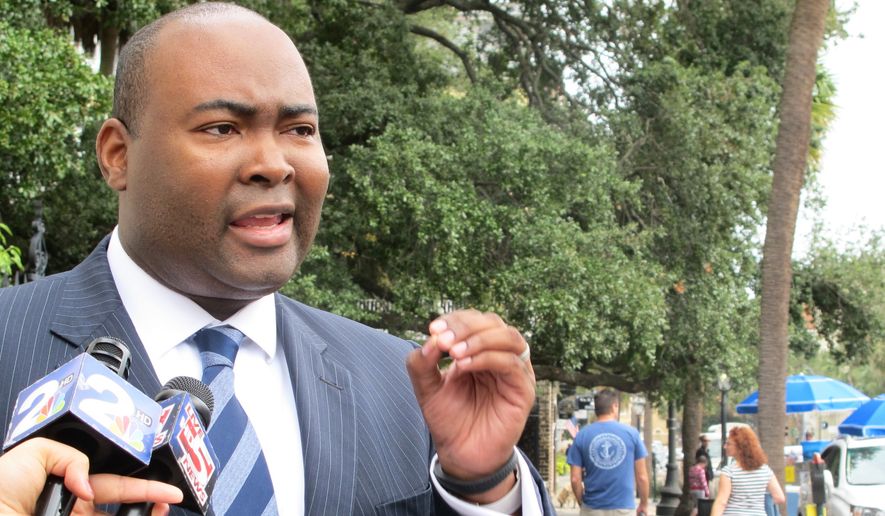South Carolina Democratic Party Chairman Jamie Harrison’s official biography calls him “a rising star” in the party, “a teacher at heart” and a family man who lives in Columbia with his law professor wife.
What his bio on the party’s Web page doesn’t mention, though, is that Mr. Harrison is also a principal at the Podesta Group, a lobbying firm founded by brothers Tony and John Podesta — the same John Podesta who is chairman of Hillary Clinton’s presidential campaign.
Mr. Harrison’s day job is likely to get more scrutiny as the presidential campaign turns to South Carolina and questions continue to swirl about whether the Democratic Party apparatus is fairly treating Mrs. Clinton’s challenger, Sen. Bernard Sanders of Vermont.
“There should be full disclosure on how someone gets paid for a living, all of their biography — especially someone as important as the chairman of the Democratic Party in South Carolina — not any part of their biography should be left out,” said Neil Sroka, spokesman for Democracy for America, a grass-roots network supporting Mr. Sanders. “There are plenty of ways of which the deck is stacked against those calling out powerful interests in this country, and we’re focused on taking out all of them.”
Neither Mr. Harrison nor the state Democratic Party returned messages seeking comment.
He won the chairman’s position in 2013, breaking a barrier by becoming the first black person to hold the post.
He was already a principal at the Podesta lobbying firm at the time, but beyond that, little else is public about his role there. Calls and emails to the firm were not returned.
Mr. Harrison has not publicly endorsed in the campaign, but progressive advocates backing Mr. Sanders said that given the recent past, including questions about how Iowa officials handled the caucuses, it would have been better if Mr. Harrison had been upfront about his job.
“If you want to avoid appearances of conflict of interest, you need to be completely open and reveal that,” said David Swanson, a spokesman at Rootsaction.org, a progressive online group that also has organized a petition asking for the ouster of the head of the Democratic National Committee. “Someone can be in favor of one candidate and still conduct a fair primary election, but if they’re hiding that they have close ties — beyond just electoral interest, but with actual monetary interests — that starts to look bad.”
In a nearly five-minute interview on MSNBC on Thursday, Mr. Harrison extensively analyzed the Feb. 27 South Carolina Democratic primary and the chances of Mrs. Clinton and Mr. Sanders — without being asked about or mentioning his connection to Mrs. Clinton’s campaign chief.
While saying Mr. Sanders had made inroads in South Carolina after his New Hampshire win, Mr. Harrison praised Mrs. Clinton’s campaign in the state and noted her deep support from a number of key Democrats. Mr. Sanders, he said, “has a tough hill to climb.”
Mr. Harrison insisted he was staying neutral in the race: “I have not endorsed anyone, and I don’t think I will,” he told MSNBC.
Mrs. Clinton already has an impressive head start in organizing in South Carolina after losing the state in the 2008 primary to Barack Obama.
She has collected more than 80 endorsements, including two former governors, and has more than 2,500 active volunteers for her campaign. Both the first and second vice chairs of the South Carolina Democratic Party support her, bucking the usual neutrality of state party officials.
Mr. Harrison has also played an active role in hosting sit-down interviews with the Democratic presidential candidates, which he dubbed “chair chats,” and publishes them online.
Mrs. Clinton used her interview with Mr. Harrison in July to take a swipe at Mr. Sanders’ connection with blacks.
“This [Black Lives Matter movement] is fueled in large measure by young people, and it is a particular development in the civil rights movement that deserves our support,” Mrs. Clinton said in that chat. “By that I mean, there are some who say, ’Well, racism is a result of economic inequality.’ I don’t believe that.
“They are asking us to face these hard questions, and shame on us if we don’t do just that.”
The dig marked the start of Mrs. Clinton’s narrative against Mr. Sanders with black voters: that he views race only through an economic lens when the reality is much more complicated.
In his interview with Mr. Sanders, Mr. Harrison asked about the senator’s experience with the civil rights movement and joining the March on Washington, where he heard the Rev. Martin Luther King Jr.
“I’ve often remarked that the first three or four times I was in Washington, I was never inside a building. I was always outside protesting,” Mr. Sanders told Mr. Harrison.
Blacks made up 56 percent of the Democratic primary voters in South Carolina in 2008, and Mr. Harrison has said in interviews that he expects an even larger share this year.
Mr. Harrison, in his official capacity as chairman, has helped arrange presidential forums and debates in the state. He also is responsible for raising money for the party in South Carolina and recruiting Democratic leaders to run for political office in a state dominated by Republicans.
In September, Mr. Harrison told Columbia’s The State newspaper that his goal was to prepare young adults to run for office, manage campaigns or lead county parties. He launched a fellowship program to help entice them to do so. By 2020, he said, he would like to have “250 people all across the state trained and equipped to do just that.”
Mr. Harrison is also responsible for the get-out-the-vote effort for local, state and national elections. It will be his committee that sends the official vote tally to the DNC to be counted after the presidential primary.
• Kelly Riddell can be reached at kriddell@washingtontimes.com.




Please read our comment policy before commenting.